10 of the best reverb VST plugins
Select your weapons carefully for arguably the most important effect processor of all
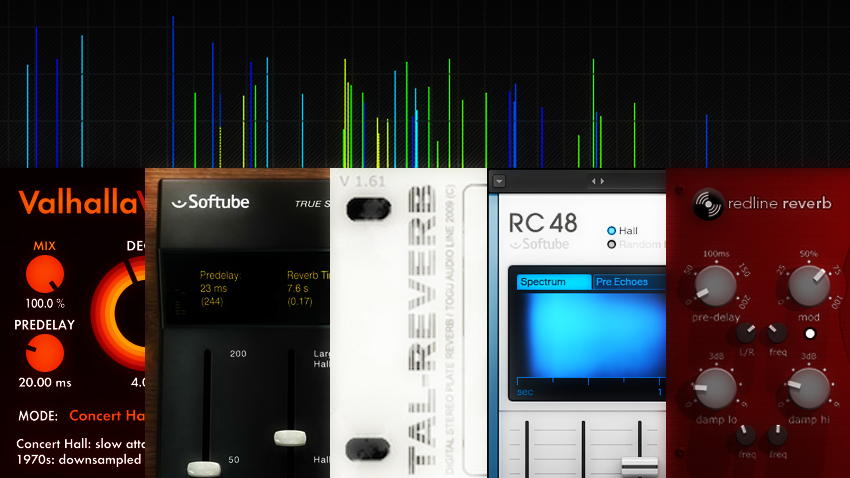
It's a space odyssey
The word ‘reverberation’ - or ‘reverb’ - conveys the idea of sound bouncing around in an enclosed space. Unless they’ve been acoustically treated (as a vocal booth in a recording studio would be), most rooms have a natural reverb.
Reverb plugins are designed to reproduce the ambience of an imaginary room or space. Alternatively, they can emulate older artificial technologies such as plate, spring and chamber reverbs. These are considered to have musically useful characteristics, and so are now emulated in plugin form.
On a basic level, reverb plugins work by generating a lot of closely spaced but random echoes to simulate reflected sound from a number of irregularly shaped objects. The end result is that each reflection is no longer heard in isolation but as part of a general ambience.
Because of the large number of calculations involved in creating a realistic sounding reverb, high quality reverb plug-ins tend to be pretty system intensive. Some are based on a technique called convolution; they’re rather CPU-hungry, but capable of breathtaking results.
Like most plugin effects, reverb should be used in moderation. In fact, reverb is often used in such small amounts that it's only noticeable when temporarily removed from the mix.
Now that we've covered the basics, let's take a look at 10 VST plugins that we reckon could well be the best available.
Next: ValhallaDSP VintageVerb
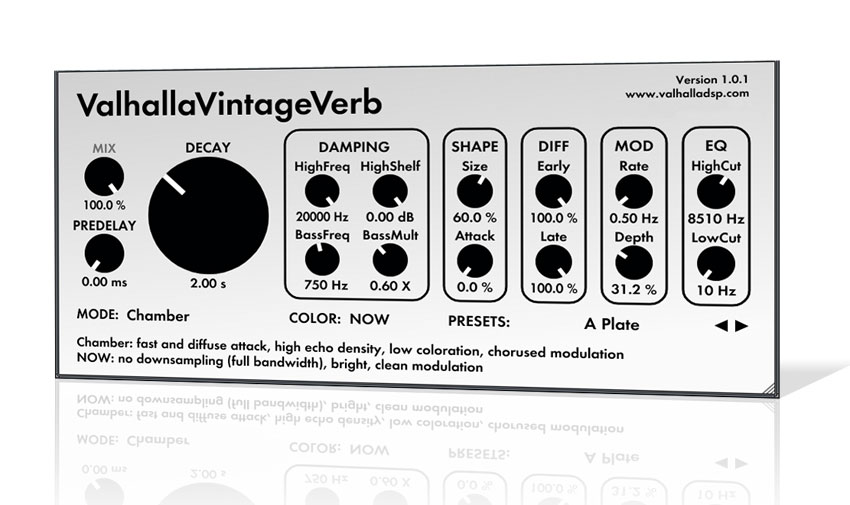
ValhallaDSP VintageVerb (PC/Mac, $50)
The VintageVerb offers a nostalgic take on the curiously crusty hardware reverbs of yesteryear. At its heart are nine mostly Lexicon-inspired reverb algorithms to choose from, covering the usual array of halls, plates, rooms and spaces, as well as a few more esoteric designs.
All stand up very well in the mix, but our favourite is the Chamber algorithm, with its beautifully smooth yet dense texture - a combination that a lot of reverb plugins don't quite manage to pull off.
Cheaper than a parking ticket, simple to understand and complete with great character and tone, this is a classy plugin.
4.5 out of 5
Full review: ValhallaDSP VintageVerb
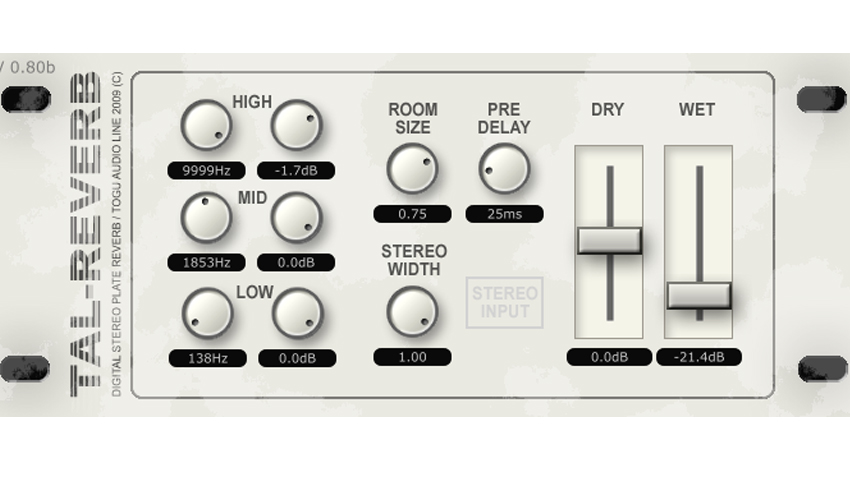
TAL-Reverb-II (PC/Mac, free)
This second version of TAL's classic reverb plugin features the plate algorithm of the original and adds a subtractive EQ and a stereo input mode.
Labels on each control let you know the values you're currently dealing with, and it's extremely simple to use: simply dial in the frequency you'd like affected - high end, low end or middle, then expand or reduce the room size and blend in the amount of effect you'd like to hear.
TAL-Reverb II is absolutely free - and although that naturally makes it a great starter reverb plugin, it's also a popular effect for more advanced music makers to use in combination with other reverbs.
Find out more about TAL-Reverb-II
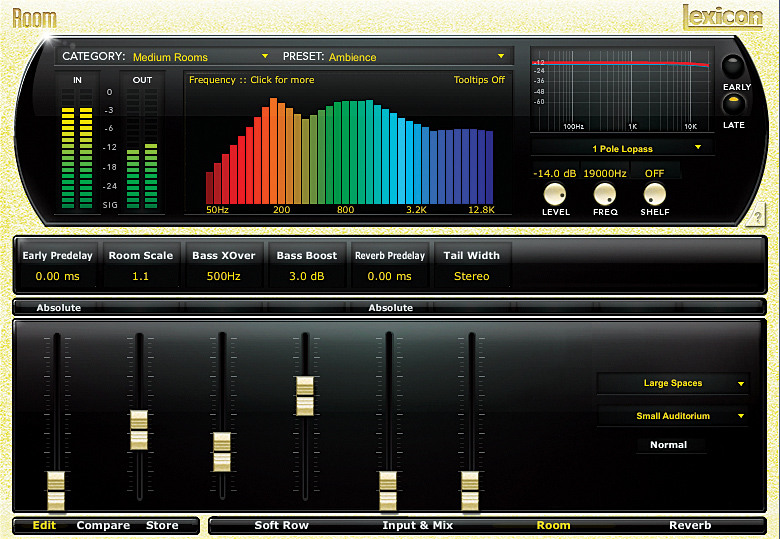
Lexicon PCM Native Reverb Plugin Bundle (Pc/Mac, $599)
Lexicon hardware units take pride of place in many pro studios, and over the company's 39-year history it's become the gold standard in digital reverberation.
The PCM Bundle utilises the algorithms and presets from the classic Lexicon PCM96 hardware reverb, at around quarter of the price (it retails around £460). What's more, an obvious bonus with the software format is that you can run as many plugin instances as your system can handle, rather than being limited by the restrictions of the hardware.
With such a hefty price tag, this plugin collection is clearly aimed at pros - yet considering it contains the exact same digital algorithms as the original, there can be no disputing that what you're getting is a virtual PCM96. As such, this bundle sounds amazing.
4.5 out of 5
Full review: Lexicon PCM Native Reverb Plugin Bundle
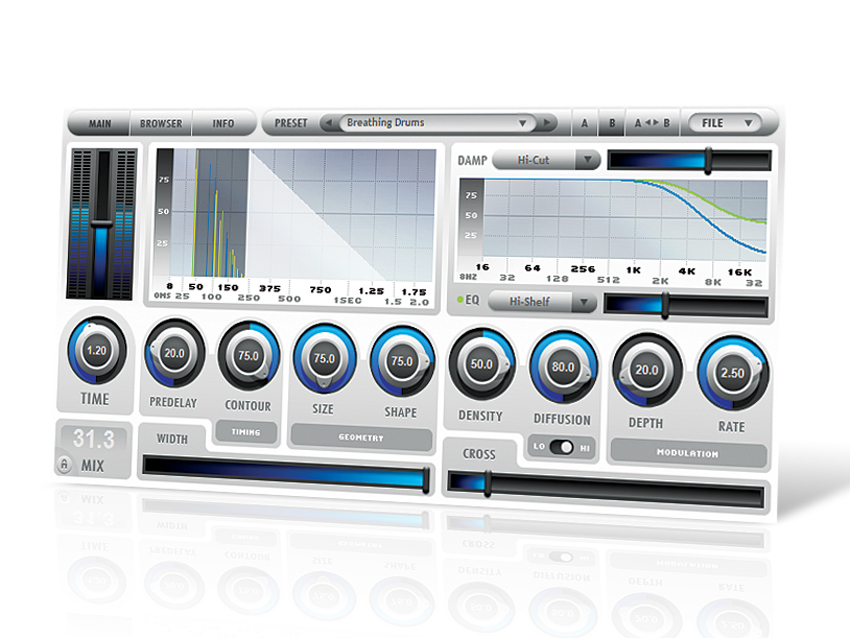
2CAudio Breeze (PC/Mac, $150)
2CAudio's second reverb is an algorithmic reverb plugin, and its release in 2011 followed the considerably more complex Aether. While Breeze has much in common with its forebear, it's not a straight cutdown version, and is certainly less CPU-intensive.
The interface is concisely laid out, with a familiar graph display that represents the reverb generated by the current settings. In this department, worthy of special mention is the Contour control, which essentially adjusts the amplitude envelope of the early stages of the reverb. It's a similar concept to the Attack/Sustain/Spread controls we love so much in Aether.
Putting Breeze to work in a mix is, well, a breeze! The relatively conservative control count means it's quick to get to grips with and doesn't leave you scratching your head as to how best to proceed.
We'd be more than happy to employ it in any mix situation, and it's a dab-hand at FX-orientated sounds, too. Breeze is for those who like their plugins to-the-point and easy-to-use, as there's really nothing superfluous to be found here.
5 out of 5
Full review: 2CAudio Breeze
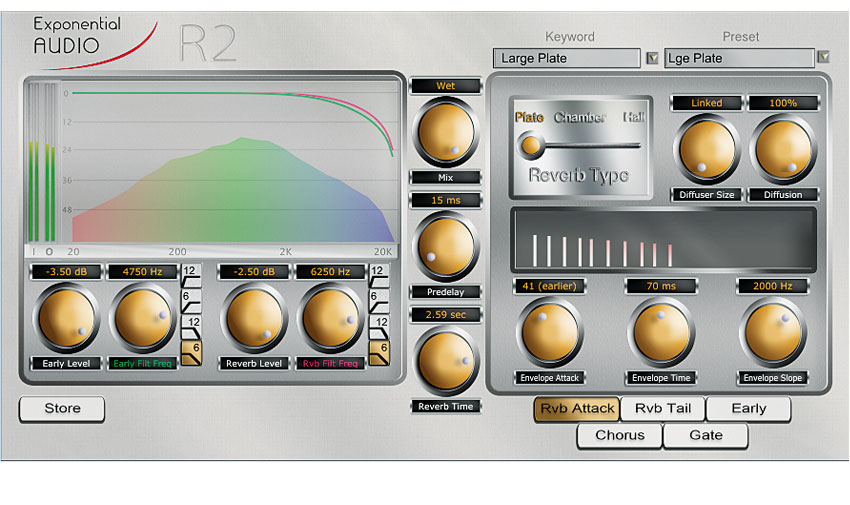
Exponential Audio Phoenix Verb (PC/Mac, $199)
Phoenix Verb was one of the debut plugins from Exponential Audio, whose founder Michael Carnes is the DSP wiz behind the PCM Bundle that we looked at in slide three. As such, this plugin demands to be taken seriously.
There's no denying that Phoenix Verb looks a tad clunky - but it's the sound that counts. Transparent and natural from the first presets that you try, the early reflections and tails from this plugin sit perfectly in the mix.
Features include a low- or high-pass filter on the reverb output, a huge range of presets that are suggested to you based on the keywords you punch in, and a Reverb Type slider which enables quick changes between Plate, Chamber and Hall modes without fully changing your preset.
Phoenix Verb really shines in quiet situations where you might expect to detect some graininess - and it's possibly the cleanest reverb we've ever heard.
4.5 out of 5
Full review: Exponential Audio Phoenix Verb
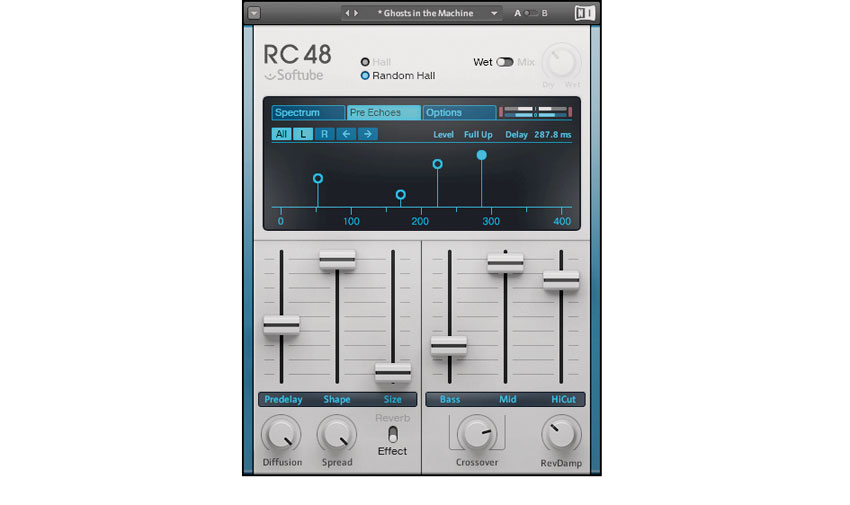
Native Instruments Reverb Classics (PC/Mac, €199)
Native Instruments' synth and sampler plugins may be better known than its effects, but more recently the company's been making a determined push into the realm of classic EQ and dynamics plugins that fall distinctly into the 'vintage emulation' category.
Running with this narrative is the Reverb Classics bundle, which consists of the enigmatically-named RC 24 (described as a 'Character Studio Hall') and the RC 48 (described as a 'Royal Studio Hall').
Despite the descriptions, they both consist of more than just plain Hall reverb algorithms, and have clearly been modelled around the classic Lexicon digital reverb sound of the Model 224 (from 1978) and the 480L (from the mid '80s).
It's a good value bundle, with the most flexible reverb being the RC 48 - which is in essence a series of customisable 'early reflections'. With straightforward editing and a great sound, these plugins offer a wide range of possible treatments.
4.5 out of 5
Full review: Native Instruments Reverb Classics
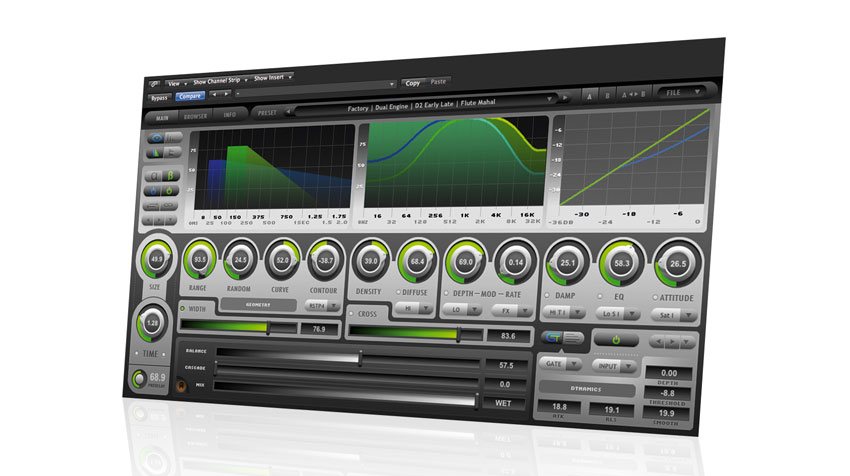
2CAudio B2 (PC/Mac, $250)
2CAudio's third and most advanced algorithmic reverb, B2, utilises twin reverb engines (based on its Breeze plug-in) that can be configured to create a wide range of internal processing structures.
As you'd expect from the makers of Aether and Breeze, B2 sounds fantastic. Lose yourself in the endless library of presets (accessed via a slick, filterable browser) and it doesn't take long to realise that this is a spectacular plugin capable of producing an incredibly broad range of effects, from subtle mastering ambiences to zany distorted echoes, via sumptuous large halls and everything in between.
Whether you're using it for music production or sound design, B2 delivers anything you could ask of it. With so many excellent presets included and an architecture that enables truly microscopic editing - not to mention the dynamics section, the Attitude control and a great-sounding global limiter - 2CAudio has come up with something that really is very, er, spatial.
4.5 out of 5
Full review: 2CAudio B2
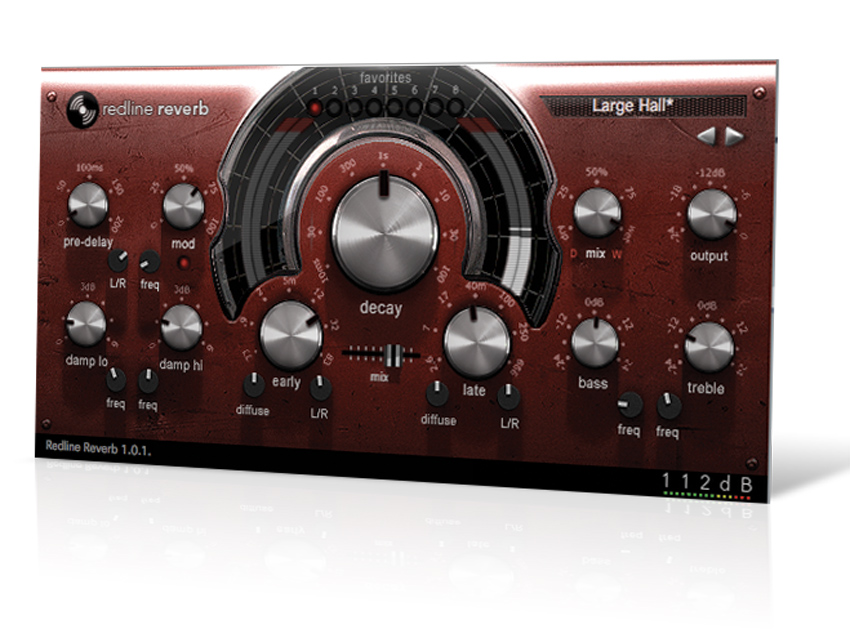
112dB Redline Reverb (PC/Mac, $150)
While many reverbs opt for convolution-charged ultra-realism or offer separate plate, hall and room algorithms, 112dB claims that its Redline Reverb takes a slightly different approach, with a single core algorithm that you can shape in a variety of ways.
The main selling point of any reverb should be its sound, and one of the things that impresses us most about Redline Reverb is its musicality. It really enhances the material, rather than fighting for space with it.
It's perhaps not the most realistic unit we've ever heard, but complaining about that would be missing the point: like the top-end digital units of yesteryear, it just sounds gorgeous. To demonstrate its abilities, place it on a vocal channel with its default settings, and you'll immediately get an effect reminiscent of an enhancer - only cleaner and sweeter.
If you want something a little special that can spice up and enhance anything from leads and pads to vocals and effects, or that can be used as an upfront creative effect, make sure you get your hands on this one.
4.5 out of 5
Full review: 112dB Redline Reverb
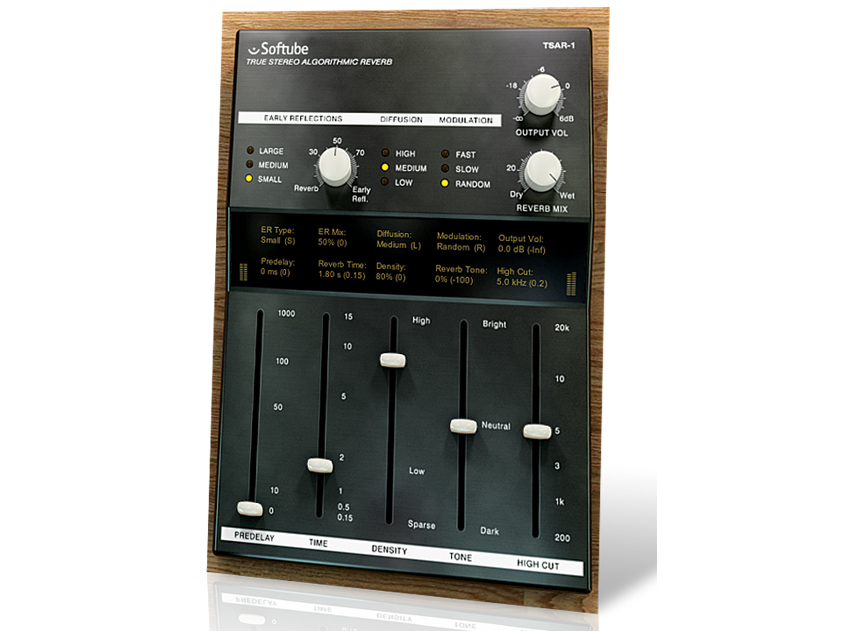
Softube TSAR-1 (PC/Mac, $269)
For a time, convolution reverbs were all the rage, narrowing the gap between the hardware reverbs (and real spaces we desired) and their sometimes inadequate software equivalents. Thankfully, the last few years have seen algorithmic reverb plugins seriously up their game.
Softube's TSAR-1 takes its sonic inspiration from a number of classic reverbs - however, it's a bang up-to-date 'true stereo' design using an algorithm that's all its own.
As expected, there is a 'signature' to the sound, and we have to say it's a very pleasing one. TSAR-1 delivers everything from a wonderful medium-sized performance space (Jazz Club), to tracking rooms (Studio A and B) as well as equipment-influenced AMS Ambience and some Lexicon 224-style presets.
In the mix, TSAR-1 produces an excellent, rich sound that meshes very well with the source material, and the CPU hit is minimal. As such, it's a solid buy if you're in the market for a serious algorithmic reverb.
4.5 out of 5
Full review: Softube TSAR-1
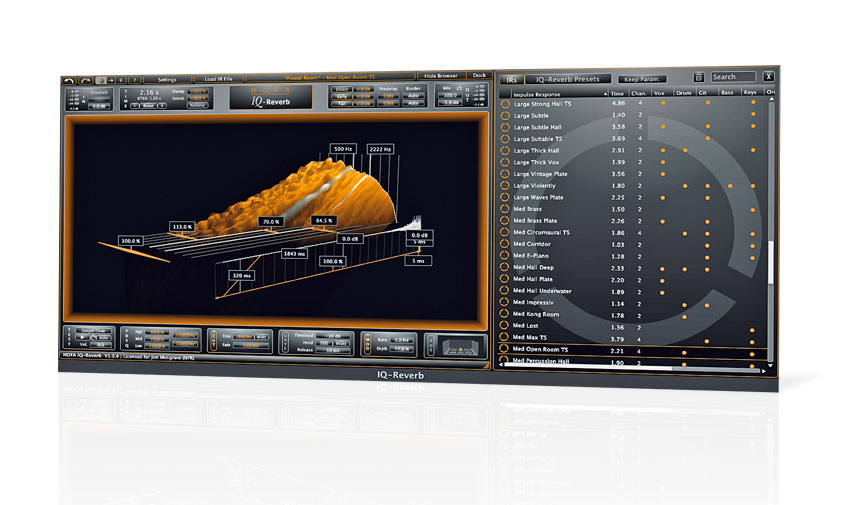
HOFA Plugins IQ-Reverb (PC/Mac €150)
This plugin offers a convolution reverb with a vintage twist in the form of algorithmic reverb features such as LFO modulation, gating and EQ, separate level control for the direct signal, early reflections and tail, and predelay settings.
Perhaps more than anything, convolution reverbs are all about their libraries, and IQ-Reverb's comprises 135 impulse responses and 95 presets. Some of the IRs are True Stereo (we counted 24) and the presets make good use of the algorithmic parameters.
IQ-Reverb is excellent, boasting a very similar feature set to Audio Ease's Altiverb, though without such an extensive library.
It's also stereo-only, though surround capabilities might be added at a later date. Even without them, though, this is a fantastic pro reverb at a great price, and its 'traditional' parameters - in particular, control over the separate reverb stages and predelays - add flexibility and familiarity.
4 out of 5